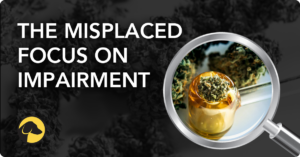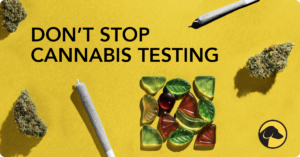
The Importance of Educating Employees About Workplace Cannabis Policies
You may have heard the old saying, “If a tree falls in a forest and no one is around to hear it, does it make a sound?”
This same question holds true for an organization’s cannabis testing policy. If you have a policy, but it hasn’t been effectively communicated to your employees, will they know it exists and how to follow it?
If not, this lack of education could be risky and lead to costly consequences for your employees and your business.
POLICY + PROGRAM
Let’s start with the basics. If you’re unfamiliar with the difference between a cannabis testing policy and a cannabis testing program, here’s a quick breakdown.
A cannabis testing policy is a set of instructions, guidance, and rules an organization uses as part of its cannabis testing program.
A cannabis testing program comprises the method(s) an organization uses to test employees for marijuana. The HOUND® CANNABIS BREATHALYZER falls into this category.
Many employers are reevaluating their drug testing programs now that employees can legally use cannabis in most states. The need to balance safety, fairness, and a competitive hiring environment has companies considering the appropriate course of action for employees who test non-negative (positive) for THC, the principal psychoactive compound found in the cannabis plant. Best practices indicate discussing these topics with legal counsel before making any changes to existing drug testing policies.
COMMUNICATION IS KEY
As our original question posits, “Can your cannabis testing policy and program really exist if your employees don’t know about them?”
A recent National Safety Council (NSC) survey of 500 employers and 1000 employees shows just over 60% of employees know their company has a policy around cannabis use.1
The results of poor employee education surrounding workplace cannabis policies are clear. Without a well-communicated policy, your employees may not know what behavior is acceptable, what substances are prohibited surrounding the workday, under what circumstances a cannabis test may be performed, and if their confidentiality will be protected. Less than 20% of employees report their company is doing a good job informing employees about their workplace cannabis policy.
“We support employers’ rights to have an impairment-free workplace, including drug testing employees for pre-employment, in reasonable suspicion cases or post-incident circumstances, and | or random drug testing programs to include cannabis,” says Katie Mueller, National Safety Council Senior Program Manager. “Our members are eager for support around how to create workplace policies on cannabis use as states legalize its use.”
Other key findings from the NSC survey include:
- 14% want clear communication via in-person meetings
- 11% would prefer more printed education materials
These findings are troubling enough on their own. But they’re even more concerning when you examine how employees feel about their organizations’ existing policies and programs.
CAN YOU HAVE A FAIR CANNABIS TESTING POLICY?
Some NSC survey respondents also report feeling their organization’s current cannabis testing policy is not fair.
Here are their reasons why:
- Limitations of testing
- Perceived inequity compared to policies for other substances
- Zero-tolerance policies and restrictions on personal use
“Surprisingly, some employers are not following the actions of policymakers on the decriminalization of cannabis. NSC encourages all employers to be aware of the actions your state and federal policymakers may consider and to have workplace policies, developed along with input from your employees, to address any changes,” says the NSC’s Mueller.
We’ve established it’s critical to have a cannabis testing policy and program, especially during the era of cannabis legalization. And that this policy needs to be routinely communicated to your employees to be effective. It’s precisely because of cannabis legalization that organizations need to re-evaluate the purpose of their policy and the solutions used within their program to ensure they meet the needs of the modern workforce. Consulting with a Medical Review Officer (MRO) and your legal counsel to best determine how to incorporate recent cannabis use into your company’s drug testing program is a critical step.
HOW TO REFINE YOUR POLICY
Workplace cannabis testing has long supported the deterrence of marijuana use in the workplace. But as Mueller indicates, the usefulness of conventional cannabis policies is increasingly limited as legalization continues to spread. Not only are we seeing states like California limit the timeframes and methods used to perform cannabis tests, so, too are we seeing the acceptance of use outside of work as a growing trend among both employers and employees.
She recommends organizations take three steps to improve their cannabis testing policies, programs, and employee education efforts:
- Establish clear, fair policies on cannabis to prevent workday use that may have an impact on safety and performance.
- Build a safety-focused culture that includes testing the use of cannabis.
- Advocate for increased access to Employee Assistance Programs.
Hound Labs, Inc. encourages customers to discuss these topics with legal counsel and your company’s MRO before making any changes to existing drug testing policies. However, overhauling your workplace cannabis testing policy and employee education efforts doesn’t have to be overwhelming. And remember, employers with the most effective drug testing programs have invested time to ensure employees are fully aware of policies that will impact them – in other words, they make sure that tree is heard.

Thank you to Katie Mueller, National Safety Council Senior Program Manager, for participating in this blog. Katie has been a safety advocate for more than 20 years. Prior to NSC, she worked for the State of Oklahoma in transportation safety and policy. Katie currently serves on The Coalition for Cannabinoid Science and Safety, as well as the National Safety Council’s Alcohol and Drug Division.

November 10, 2022
By TRICIA O'CONNOR
Director of Content + Brand Strategy
Share











